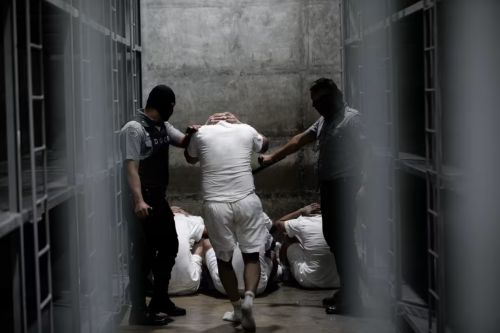

It is unclear how much U.S. money has actually been spent, whether any monitoring mechanisms exist, or if conditions were attached beyond the vague stipulations already disclosed.

By Matthew A. McIntosh
Public Historian
Brewminate
Introduction
The Biden administration’s deportation machinery was controversial, but Donald Trump’s second presidency has taken the practice into new and uncharted territory. In March, his administration quietly funneled nearly $5–6 million to El Salvador to hold hundreds of deportees, not just Salvadorans, but people of any nationality, in the country’s notorious mega-prison known as CECOT. According to reporting from Newsweek and Context, detainees were shipped out even when U.S. courts had issued protective orders blocking removal, raising constitutional alarms about due process and separation of powers.
Critics warn the deal is not just unlawful but wasteful: it costs more to outsource detention abroad than to process migrants through U.S. systems, where many had already been living legally before sudden rule changes rendered them “illegal.” Senators from both parties have pressed for answers, asking whether the payments violated U.S. law and whether the money is being siphoned off into the coffers of El Salvador’s strongman President Nayib Bukele. As Senator Chris Van Hollen put it after meeting Salvadoran officials, the arrangement appeared disturbingly simple: “They send people. We host them. They pay. And that’s it.”
Background / Context
The centerpiece of the arrangement is El Salvador’s CECOT (Terrorism Confinement Center), a sprawling mega-prison constructed under Bukele’s state of emergency and already notorious for its harsh conditions. Built to hold tens of thousands of suspected gang members, CECOT has drawn widespread criticism from international human rights groups for allegations of torture, indefinite detention without trial, and inhumane treatment. Now, through a new U.S. deal, the facility has become the holding ground for deportees from America, regardless of their nationality.
The legal hook for this program is the Alien Enemies Act of 1798, one of the original Alien and Sedition laws. The Trump administration has argued that the centuries-old statute gives the president sweeping authority to remove non-citizens during times of conflict. In practice, this has meant bypassing traditional immigration hearings in favor of expedited deportations. Critics contend that the use of the law is both a distortion of its intent and a violation of constitutional guarantees. As Newsweek reported, federal courts had repeatedly issued protective orders to halt removals, yet deportation flights to El Salvador continued.
In March 2025, the first waves of detainees arrived in San Salvador, including dozens of Venezuelans and Central Americans swept up under the new rules. According to Context, many had no criminal record in the United States and were caught in shifting definitions of “illegal presence.” Some were mid-process in asylum applications; others had lived in the U.S. legally until regulatory changes abruptly stripped their status. For them, the sudden deportations were not only life-altering but constitutionally suspect.
The Deal: Payments and Terms
Court filings and press investigations have revealed that the Trump administration authorized a $4.76 million payment to El Salvador to cover the “costs associated with detaining” 238 men shipped there under the new deportation program. Human rights attorneys with RFK Human Rights say this was effectively a lump-sum check cut to the Salvadoran government in exchange for locking up people who, in many cases, had not been charged with crimes in either country. Other reporting by Context suggests the total may have reached closer to $6 million, a figure officials in both countries have declined to confirm or deny.
The agreement was highly specific: El Salvador would accept migrants deported from the United States, regardless of nationality, and house them in CECOT. In return, U.S. funds were earmarked strictly for detention purposes. The deal explicitly barred their use for “legal counseling or referrals,” effectively ensuring that detainees would have little recourse to contest their confinement. As Newsweek uncovered, it also prohibited payments to any third party that might aid migrants, closing off avenues of independent support.
The timing of the deal raised further alarms. Just as federal courts were issuing injunctions blocking deportations, the administration was wiring millions abroad to cement its ability to bypass domestic rulings. That prompted Senator Chris Van Hollen and others to demand clarity on which State Department accounts were tapped for the funds and whether the payments had been subject to any human rights vetting at all.
Legal, Political, and Ethical Challenges
The El Salvador payments have triggered a wave of legal and political pushback in Washington. Senators Chris Van Hollen and Ed Markey, joined by other Democratic colleagues, have demanded a full accounting of how the Trump administration authorized the funds, warning that the arrangement could violate U.S. law. Their letter to the State Department specifically cited the Leahy Law, which prohibits U.S. assistance to foreign security forces implicated in human rights abuses, and pressed officials to explain whether any vetting occurred before millions were wired abroad.
Human rights advocates argue the risks are glaring. CECOT, the prison where most detainees are held, has been described as a site of torture, starvation, and indefinite detention. Reports from Newsweek and others detail overcrowding, lack of medical care, and the absence of any meaningful judicial oversight. By paying to send deportees there, the United States is seen as complicit in abuses it would not legally be allowed to conduct on its own soil.
One case has become emblematic: Kilmar Abrego García, a Venezuelan asylum seeker, was deported despite a U.S. court order barring his removal. When Senator Van Hollen traveled to El Salvador to press for his release, Vice President Félix Ulloa bluntly acknowledged the arrangement: “We have a deal with the U.S. government. They send people. We host them. They pay. And that’s it.” The U.S. Supreme Court later ordered the government to facilitate Abrego’s return, underscoring the constitutional crisis brewing over executive power and judicial authority.
Critics also point out the economics make little sense. Immigration lawyers and policy experts argue it is more expensive to outsource detention abroad than to process migrants domestically, where infrastructure and oversight already exist. Many of those targeted had been living in the U.S. legally until sudden regulatory changes reclassified them as deportable. For opponents, that suggests the policy was less about cost savings or public safety than about creating a spectacle of toughness on immigration.
Allegations of Corruption and Lack of Oversight
Beyond questions of legality and human rights, critics in both Washington and San Salvador warn the deal is ripe for corruption. Local sources in El Salvador have told reporters that the money may be quietly enriching officials at the top, with little transparency over how the funds are actually spent once they leave U.S. accounts. Bukele has used his prison system as a political stage, showcasing CECOT as proof of his iron-fisted governance. For many observers, the sudden influx of U.S. dollars looks less like cooperation and more like a direct subsidy for Bukele’s political machine.
The agreement itself attempts to address corruption concerns on paper, prohibiting payments to third parties “linked to criminal activities” and mandating that funds be used solely for detention. Yet, as Newsweek noted, those restrictions are virtually unenforceable once the money arrives. With no independent monitors on the ground and no detailed accounting provided to Congress, it is impossible to know whether U.S. dollars are paying for food, security, or simply padding government coffers.
Lawmakers are pressing for answers. In their letter, Senators Van Hollen and Markey demanded copies of the underlying agreements, human rights vetting reports, and any audits of how the funds were used. So far, the administration has not provided them. The lack of oversight has fueled suspicions that the payments are less about detaining migrants and more about a political bargain, one that allows Trump to claim hardline victories on immigration while giving Bukele fresh resources to tighten his grip at home.
Consequences and Risks
The fallout from the El Salvador deal extends far beyond the immediate detainees. Legal experts warn that outsourcing detention sets a dangerous precedent: if the United States can simply pay foreign governments to house migrants, it could further erode domestic accountability and sidestep judicial oversight. Critics compare it to the CIA’s post-9/11 practice of “extraordinary rendition,” when terror suspects were secretly shipped to foreign prisons to avoid U.S. legal constraints.
The constitutional implications are equally stark. By continuing deportations despite protective orders, the Trump administration has openly challenged the authority of federal courts. Scholars argue this risks a direct confrontation between the executive and judicial branches, undermining the separation of powers at the core of the Constitution. As Newsweek reported, even the Supreme Court’s intervention in the Abrego García case was initially brushed aside by administration officials who insisted their hands were tied.
For the detainees themselves, the consequences are immediate and severe. Reports from Context describe prisoners confined without charges, cut off from legal representation, and held in a facility already notorious for abuse. Families are left without contact or clarity about the fates of their loved ones, while humanitarian groups are barred from providing aid.
Diplomatically, the U.S. risks entangling itself in Bukele’s authoritarian project. By funneling millions into El Salvador’s prison system, Washington lends legitimacy to policies widely condemned by international watchdogs. This could complicate America’s relationships with regional partners and weaken its standing in global human rights forums. As one Senate aide told Yahoo News, “Instead of strengthening rule of law, we’re exporting lawlessness.”
Counterarguments and Official Responses
The Trump administration has defended the El Salvador payments as a legitimate tool of foreign policy and national security. Officials argue that the arrangement helps remove dangerous individuals from U.S. soil more quickly and relieves pressure on domestic detention centers already strained by record deportations. Citing the Alien Enemies Act, they maintain the president has clear authority to strike such agreements, especially during what they describe as a crisis at the border.
The State Department and Immigration and Customs Enforcement (ICE) have also suggested the program is subject to oversight, pointing to contractual language that restricts how the funds may be used. They insist the deal includes compliance requirements and argue that El Salvador’s willingness to cooperate demonstrates a model of regional burden-sharing. Supporters of the program frame it as both a cost-effective solution and a deterrent to future migration.
El Salvador’s government has likewise leaned into that narrative. Bukele and Vice President Félix Ulloa have characterized the partnership as a pragmatic exchange that benefits both nations. By their account, U.S. funds strengthen Salvadoran security institutions while signaling Bukele’s alignment with Trump’s hardline immigration agenda. In public statements, officials have emphasized sovereignty and framed U.S. criticism as political interference.
Still, critics counter that these assurances ring hollow without independent audits or on-the-ground monitoring. As Yahoo News noted, administration officials have repeatedly failed to provide basic details when pressed, leaving lawmakers and watchdogs skeptical of the program’s true scope and intent.
Open Questions and What to Watch
Despite months of reporting and congressional inquiries, much about the El Salvador deal remains opaque. Lawmakers are still demanding full copies of the underlying agreements, audits, and human rights assessments. Until those documents are released, it is unclear how much U.S. money has actually been spent, whether any monitoring mechanisms exist, or if conditions were attached beyond the vague stipulations already disclosed.
For detainees, the future is even murkier. Will those currently held in CECOT ever face charges, be repatriated, or gain access to asylum proceedings? Or will they remain in indefinite confinement, beyond the reach of both U.S. and Salvadoran courts? The fate of Kilmar Abrego García, only freed after the U.S. Supreme Court intervened, suggests many others may still be trapped in legal limbo.
International fallout is another open front. If the U.S. continues to bankroll prisons abroad while ignoring court orders at home, it risks drawing condemnation from human rights bodies and straining ties with allies. Some analysts warn that other governments may exploit similar deals, turning detention into a profit-driven export industry.
Finally, the constitutional clash is unresolved. Will the courts reassert authority and rein in the executive branch, or will Trump’s precedent of outsourcing deportations stand? The answers will shape not only the lives of thousands of migrants but also the balance of power between Congress, the courts, and the presidency itself.
Originally published by Brewminate, 10.02.2025, under the terms of a Creative Commons Attribution-NonCommercial-NoDerivatives 4.0 International license.


